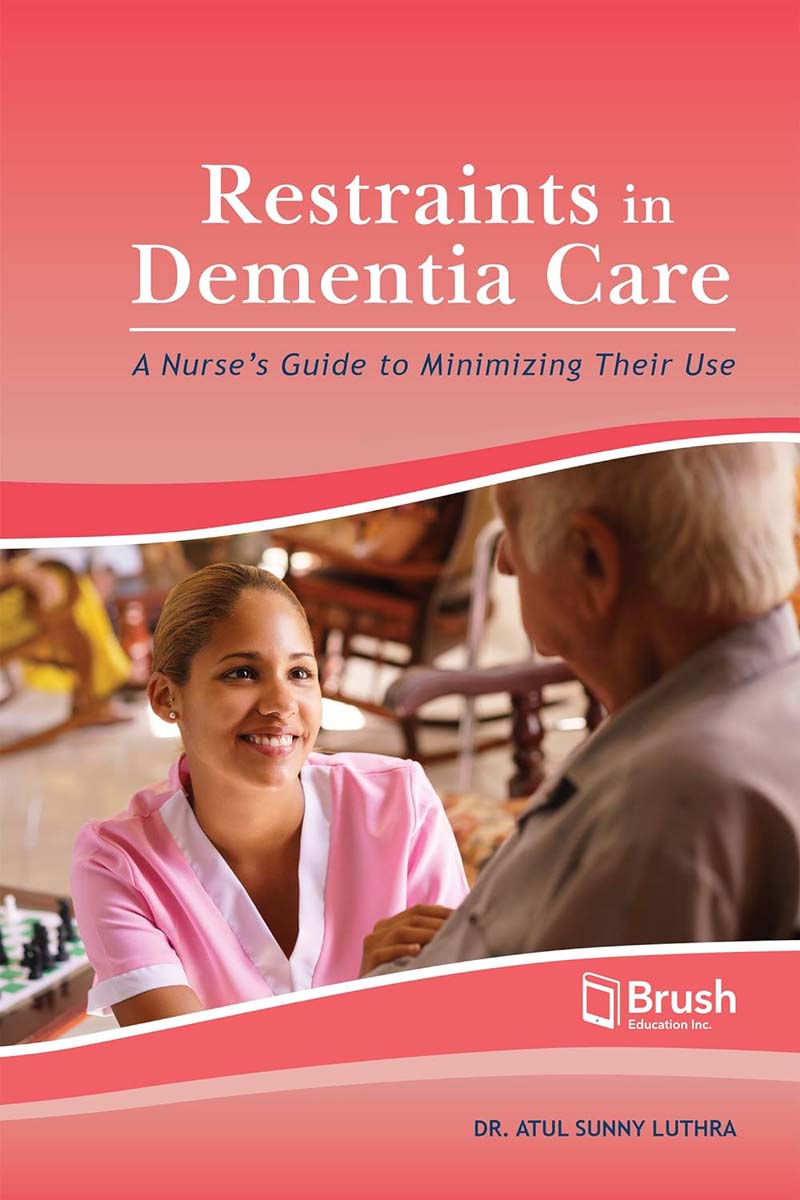PB:
21.00 GBP
QTY:
Restraints in Dementia Care
A Nurse's Guide to Minimizing Their Use
Your best tool to optimize patient care by minimizing restraint use.
Frontline nurses face fraught decisions every day about whether and how to use restraints in dementia care. They need to consider many complicated issues: legislation governing the use of restraints, the policies of health-care facilities, the expectations of families, and—most importantly—the well-being, dignity, and safety of patients and care providers.
Frontline nurses need the right support to navigate decisions about restraint use.
Dr. Atul Sunny Luthra and his colleagues have developed an algorithm to provide that support. Their work comes from focus-group consultations with frontline staff, a review of current literature on restraint use, and a clear summary of key legislation. The algorithm's systematic approach ensures restraints are a last-resort measure, and puts the right steps in place when restraints are necessary.
This short guide includes:
- A review of nurses' perspectives on restraint use
- Alternatives to restraints in patient management and assessment of clinical indicators for restraint use
- Procedures to ensure informed consent when restraints are necessary
- A reference on appropriate and inappropriate restraint use in everyday clinical situations
Table of Contents:
Introduction
1. Five clinical scenarios: perspectives on restraint use from frontline staff at Homewood Health Centre
2. Nurses' perceptions of restraint use: A literature review
3. Clinical indicators for restraint use: A literature review
4. The law and restraint use
5. Obtaining informed consent for restraint use
6. A decision-making algorithm for restraint use in dementia care
7. A reference on appropriate restraint use
References
About the authors
Browse inside:
https://books.google.ca/books?id=BaGgDwAAQBAJ&printsec=frontcover&source=gbs_ge_summary_r&cad=0#v=onepage&q&f=false
Frontline nurses face fraught decisions every day about whether and how to use restraints in dementia care. They need to consider many complicated issues: legislation governing the use of restraints, the policies of health-care facilities, the expectations of families, and—most importantly—the well-being, dignity, and safety of patients and care providers.
Frontline nurses need the right support to navigate decisions about restraint use.
Dr. Atul Sunny Luthra and his colleagues have developed an algorithm to provide that support. Their work comes from focus-group consultations with frontline staff, a review of current literature on restraint use, and a clear summary of key legislation. The algorithm's systematic approach ensures restraints are a last-resort measure, and puts the right steps in place when restraints are necessary.
This short guide includes:
- A review of nurses' perspectives on restraint use
- Alternatives to restraints in patient management and assessment of clinical indicators for restraint use
- Procedures to ensure informed consent when restraints are necessary
- A reference on appropriate and inappropriate restraint use in everyday clinical situations
Table of Contents:
Introduction
1. Five clinical scenarios: perspectives on restraint use from frontline staff at Homewood Health Centre
2. Nurses' perceptions of restraint use: A literature review
3. Clinical indicators for restraint use: A literature review
4. The law and restraint use
5. Obtaining informed consent for restraint use
6. A decision-making algorithm for restraint use in dementia care
7. A reference on appropriate restraint use
References
About the authors
Browse inside:
https://books.google.ca/books?id=BaGgDwAAQBAJ&printsec=frontcover&source=gbs_ge_summary_r&cad=0#v=onepage&q&f=false
About the author
Atul Sunny Luthra, MD, MSc, FRCPC, is the medical coordinator for the Program for Older Adults at Homewood Health Centre in Guelph, Ontario, Canada. He is the medical lead in the Behavioural Health Unit at St. Peter's Hospital, Hamilton Health Sciences, and is an associate clinical professor in the Department of Psychiatry and Behavioural Neurosciences at McMaster University in Hamilton, Ontario, Canada. He is also a research scientist with Schlegel's Research Institute in Aging at the University of Waterloo in Kitchener-Waterloo, Ontario, Canada.
Yarima Gonzalez is an occupational therapist who practises in Toronto and Brampton, Ontario, Canada. She completed a master's degree in occupational therapy (MSc OT) at the University of Toronto and a BSc (Biology, Co-op) at the University of Waterloo. She worked in a research role at Homewood Health Centre, Guelph, Ontario, under Dr. Atul Sunny Luthra, and with the Murray Alzheimer Research and Education Program (MAREP) at the University of Waterloo. She currently works at Altum Health, Toronto Western Hospital, University Health Network, as an occupational therapist in mental health, hand therapy, and concussion treatment.
Heather Millman is Project Coordinator at the Homewood Research Institute in Guelph, Ontario, where she focuses on research related to substance use and posttraumatic stress disorder. She received her MA from the University of Guelph, and has previously held research positions at the Region of Waterloo Public Health Services, Sanctuary Refugee Health Centre, and the Program for Older Adults at Homewood Health Centre.
Yarima Gonzalez is an occupational therapist who practises in Toronto and Brampton, Ontario, Canada. She completed a master's degree in occupational therapy (MSc OT) at the University of Toronto and a BSc (Biology, Co-op) at the University of Waterloo. She worked in a research role at Homewood Health Centre, Guelph, Ontario, under Dr. Atul Sunny Luthra, and with the Murray Alzheimer Research and Education Program (MAREP) at the University of Waterloo. She currently works at Altum Health, Toronto Western Hospital, University Health Network, as an occupational therapist in mental health, hand therapy, and concussion treatment.
Heather Millman is Project Coordinator at the Homewood Research Institute in Guelph, Ontario, where she focuses on research related to substance use and posttraumatic stress disorder. She received her MA from the University of Guelph, and has previously held research positions at the Region of Waterloo Public Health Services, Sanctuary Refugee Health Centre, and the Program for Older Adults at Homewood Health Centre.


